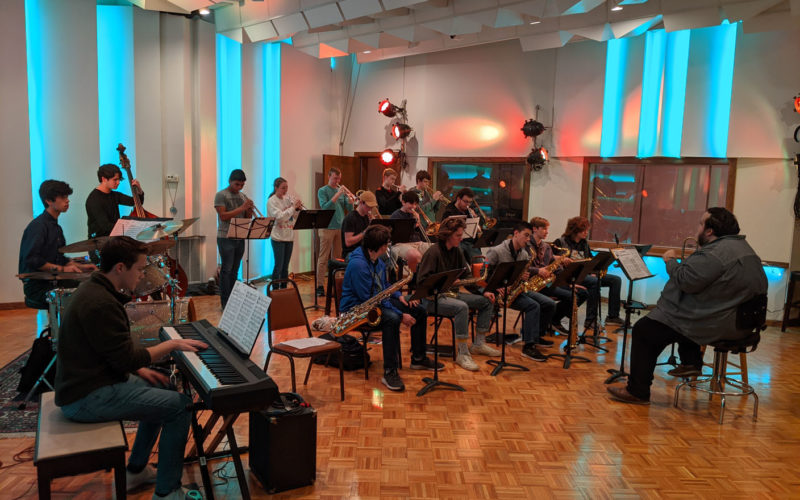Quarantine offers opportunity for jazz students
LARA JO HIGHTOWER
lhightower@nwadg.com
The news that he would be moving with his family from Kansas City to Prairie Grove in the middle of his junior year did not land easily on 17-year-old Nathan Speinmuller’s shoulders. The talented trumpet player had earned a place in his high school band, as well as first chair in the honorable mention band for All State. Would moving to a school with a band half his previous school’s size mean his musical trajectory would be cut short?
“I was worried at first,” he admits. “But then my mom found the Northwest Arkansas Jazz All Stars Youth Ensemble, and that gave me something to look forward to.”
The group, now in its fourth year, was started by the Northwest Arkansas Jazz Society under Executive Director Robert Ginsburg, who plucks 15 talented high school students from nine area high schools via auditions to study with professional musicians and perform jazz in a big band format from February to May.
“We rehearse from 10 to 11 weeks, every Sunday, for two-and-a-half hours,” says Ginsburg who, in addition to helming the Jazz Society is the Walton Arts Center’s jazz curator and has been hosting a jazz radio show on KUAF for over 40 years. “We have five professional musicians that the kids work with, specialists in their fields, who really drill down on specific strengths and weaknesses. This process leads to not only focused attention on how to master their instruments, but we also really get into the fundamentals of maintaining pitch and not rushing or dragging, coordinating that with what it is to play with a large ensemble — that quality of jazz that makes it so American. Everyone on the team is potentially a star, but nobody can do anything unless all are pulling in the same direction. When it clicks, and you feel the energy of 15 people, all driving in the same direction, it’s amazing to see.”
Ginsburg says this kind of jazz training is beneficial to young musicians, whether they plan on continuing on in the genre or not.
“It becomes apparent when you look at musicians who are popular and famous in other genres — quite often, the best of those are the ones that have had jazz training,” he says. “Whether they’re playing jazz or not, it gives you the vocabulary to expand the genre, regardless of what it is. One of the things about improv and jazz is that there are no mistakes, only opportunities — just like this conversation. We’re improvising. We don’t have a script. We know the vocabulary, and the more words you know, the more articulate you are. That’s what makes jazz musicians so strong. Their vocabulary is somewhat expanded — they realize they don’t have to steer between the curves; they can go between the ditches and come back. That’s what makes it so exciting.”

The Northwest Arkansas Jazz All Stars Youth Ensemble members were able to rehearse in person — until March, when covid-19 shut down the rehearsal process. Northwest Arkansas Jazz Society Executive Director Robert Ginsburg formulated a plan to record two pieces of music in a studio, film the process and publish the result on YouTube.
(Courtesy Photo)
The Youth Ensemble experience usually culminates with a live performance in May — but, of course, not this year. The group canceled live rehearsals in mid-March when cases of covid-19 were swelling, and it appeared that its season might be over. But then Ginsburg started seeing the prevalence of musicians producing content on YouTube for their fans, and he realized there was no reason the Youth Ensemble couldn’t do the same.
“Recording individual parts by playing along to a track is fast becoming an essential skill for working musicians,” says Ginsburg of the ensemble’s recordings of “Count Bubba” and “Mambo Caliente.” “While we mourned the loss of the public concert at Walton Arts Center, we were excited to develop this valuable recording technique in the next generation of professional jazz musicians. We could not be more proud of the level of musicianship and professionalism these videos display.
“What it did that was different from the usual goal of the program — getting these kids to actually perform in time and space with fellow musicians — was that it really pushed their noses into what happens in the recording studio. Not only could we help them explore multiple takes, but, also, ‘Eric, here’s what you did wrong on that,’ and then immediately play it back and they hear what they did wrong. There’s no better teacher than immediate feedback. And we ended up with this tangible result from the process. I’m sure some of these kids will play these recordings for their kids, years from now.”
In July, says Ginsburg, the ensemble was also able to play their songs live, in front of a small crowd of family members at George’s Majestic Lounge, where owner Brian Crowne offered the stage. Ginsburg says with social distancing both on stage and off and Crowne’s ultraviolet light air purifiers in effect, risk was at a minimum, and the young jazz players finally got a taste of what it was like to play big band jazz in front of a live audience.
Despite the cruel interruption of covid-19, says Speinmuller, the experience was overwhelmingly positive and educational.
“It was a lot of fun,” he says enthusiastically. “It was great to play with some of the best high school musicians in Northwest Arkansas. This is a higher level of jazz than I’ve ever played, and I appreciated it a lot.”
__
FYI
Listen!
Hear the NWA Jazz All Stars Youth Ensemble performance at digijazz.com.
Give!
Support the educational efforts of the NWA Jazz Society by sending your tax-deductible donation to Northwest Arkansas Jazz Society, 962 Dogwood Lane, Fayetteville, AR 72701.



